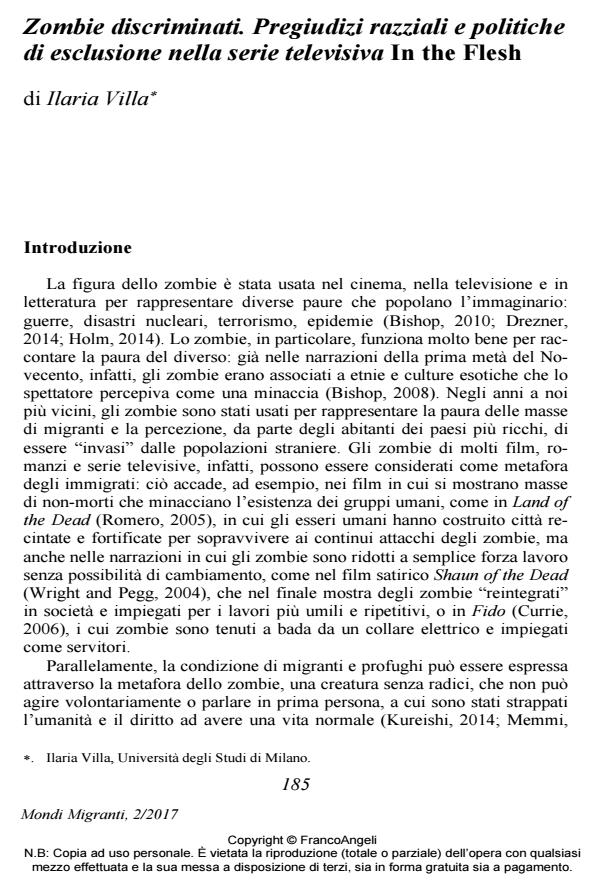Zombies and discrimination. Racial prejudice and policies of exclusion in the television series In the Flesh
Journal title MONDI MIGRANTI
Author/s Ilaria Villa
Publishing Year 2017 Issue 2017/2 Language Italian
Pages 19 P. 185-203 File size 188 KB
DOI 10.3280/MM2017-002010
DOI is like a bar code for intellectual property: to have more infomation
click here
Below, you can see the article first page
If you want to buy this article in PDF format, you can do it, following the instructions to buy download credits

FrancoAngeli is member of Publishers International Linking Association, Inc (PILA), a not-for-profit association which run the CrossRef service enabling links to and from online scholarly content.
The zombie in cinema, television and literature has often been used to represent the fear of the other. A recent and very interesting example in this tradition is the British television series In the Flesh (2013-2014), which, for the first time in the history of the zombie genre, portrays zombies receiving medical treatment. Thanks to the treatment, the zombies are given back their consciousness and are able to live a normal life again, but many people fight against the reintegration of the undead: this is a way to represent the discrimination of migrants in contemporary society. The association between migrants and zombies can be seen and analysed in many aspects of the story, both in the personal and in the political sphere. The most interesting aspect of the series is that it does not only talk about discrimination, but brings the viewer to question their own prejudices and to consider certain assumptions related to immigration management which they may have never challenged.
Keywords: Zombies; migrants; television; discrimination; tv series
- Bishop K.W. (2008). The Sub-Subaltern Monster: Imperialist Hegemony and the Cinematic Voodoo Zombie. The Journal of American Culture, 31, 2: 141-152;
- Agamben G. (1995). Homo sacer. Il potere sovrano e la nuda vita. Torino: Einaudi.
- Arendt H. (1979). The Origins of Totalitarianism. San Diego, New York, London: Harcourt Brace & Company.
- Bbc News (2015). Policy guide: Where the parties stand. BBC News. Testo disponibile al sito: http://www.bbc.com/news/election/2015/manifesto-guide.
- Bishop K.W. (2010). American Zombie Gothic: The Rise and Fall (and Rise) of the Walking Dead in Popular Culture. Jefferson: McFarland.
- Huntman C.J. (2014). Why I, as a local businessman had had enough – and chose Ukip, Ukip; www.ukip.org/cllr_jamie_huntman_why_i_as_a_local_business-man_had_had_enough_and_chose_ukip.
- Currie A., dir. (2006). Fido. Canada.
- Diken B. and Laustsen C.B. (2003). ‘Camping’ as a Contemporary Strategy. From Refugee Camps to Gated Communities, Amid (Academy for Migration Studies in Denmark) Working Paper Series, 32: 1-26; http://vbn.aau.dk/files/17431469/Amid_wp_32.
- Drezner D.W. (2014). Metaphor of the Living Dead: Or, the Effect of the Zombie Apocalypse on Public Policy Discourse. Social Research: An International Quarterly, 81, 4: 825-849.
- Heller J. (1999 [1961]). Catch-22. A Novel, New York: Simon and Schuster.
- Holm I.W. (2014). Zombies and Citizens: The Ontopolitics of Disaster in Francis Lawrence’s I Am Legend. In: Capeloa Gil I. and Wulf C. (eds.), Hazardous Future: Disaster, Representation and the Assessment of Risk, Berlin, De Gruyter.
- KhosraviNik M. (2010). The representation of refugees, asylum seekers and immigrants in British newspapers. A critical discourse analysis. Journal of Language and Politics, 9, 1: 1-28;
- Kureishi H. (30 May 2014). The migrant has no face, status or story. Immigration has become a prison of cliche in Europe. The Guardian; www.theguardian.com/books/2014/may/30/hanif-kureishi-migrant-immi-gration-1.
- Lynn N. and Lea S. (2003). ‘A phantom menace and the new Apartheid’: the social construction of asylum-seekers in the United Kingdom. Discourse & Society, 14, 4: 425-452; DOI: 10.1177/0957926503014004002
- Mason R., Booth R., Gentleman A. (4 July 2016). Nigel Farage resigns as Ukip leader after ‘achieving political ambition’ of Brexit; www.theguardian.com/politics/2016/jul/04/nigel-farage-resigns-as-ukip-leader.
- Memmi A. (2007). Decolonization and the Decolonized. Minneapolis: University Minnesota Press.
- Meadows S., dir. (2006). This is England. UK.
- Mitchell D., dir. (2014). In the Flesh, Series 1. UK.
- Mitchell D., dir. (2014). In the Flesh, Series 1. UK.
- Papastergiadis N. (2009). Wog Zombie. The De-and Re-Humanisation of Migrants, from Mad Dogs to Cyborgs. Cultural Studies Review, 15, 2: 147-178;
- Rojo L.M. and Van Dijk T.A. (1997). ‘There is a Problem, and It was Solved!’: Legitimating the Expulsion of ‘Illegal’ Migrants in Spanish Parliamentary Discourse. Discourse & Society, 8: 523-66; DOI: 10.1177/0957926597008004005
- Romero G., dir. (2005). Land of the Dead. Usa, Canada, France.
- Schain M.A. (2006). The extreme-right and immigration policy-making: Measuring direct and indirect effects. West European Politics. 29, 2: 270-289; DOI: 10.1080/01402380500512619
- Stratton J. (2011). Zombie trouble: Zombie texts, bare life and displaced people. European Journal of Cultural Studies, 14, 3: 265-281; DOI: 10.1177/1367549411400103
- The Telegraph (6 November 2007). Enoch Powell’s 'Rivers of Blood' speech; www.telegraph.co.uk/comment/3643823/Enoch-Powells-Rivers-of-Blood-speech.html.
- Tournier-Sol K. (2015). Reworking the Eurosceptic and Conservative Traditions into a Populist Narrative: Ukip’s Winning Formula?, Journal of Common Market Studies, 53, 1: 140-156;
- Ukip (15 April 2015). Ukip 2015 Election Manifesto launch, read a clear summary of the full document; www.ukip.org/ukip_manifesto_summary.
- Wilkinson M. (05 March 2015). Immigration policies: General Election 215 and how each party will tackle it. The Telegraph; http://www.telegraph.co.uk/news/general-election-2015/11451936/General-Election-2015-Immigration-policy.html.
- Wright E. and Pegg S., dir (2004). Shaun of the Dead. UK, France, Usa.
- Yimer D., dir (2014). Va’ pensiero. Storie ambulanti. Italia.
Ilaria Villa, Zombie discriminati. Pregiudizi razziali e politiche di esclusione nella serie televisiva In the Flesh in "MONDI MIGRANTI" 2/2017, pp 185-203, DOI: 10.3280/MM2017-002010